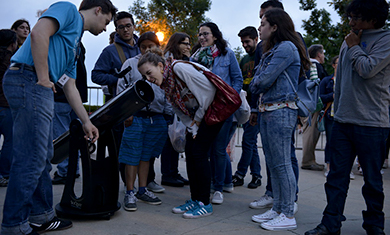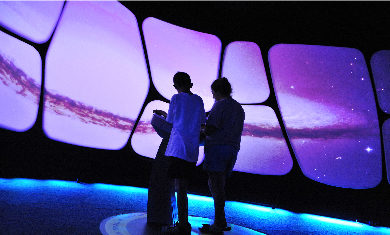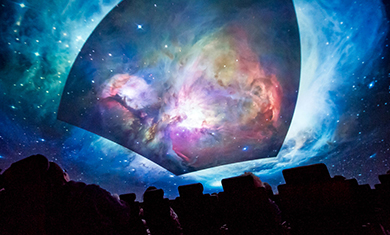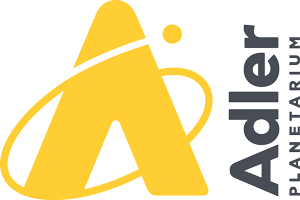Meet Our Researchers
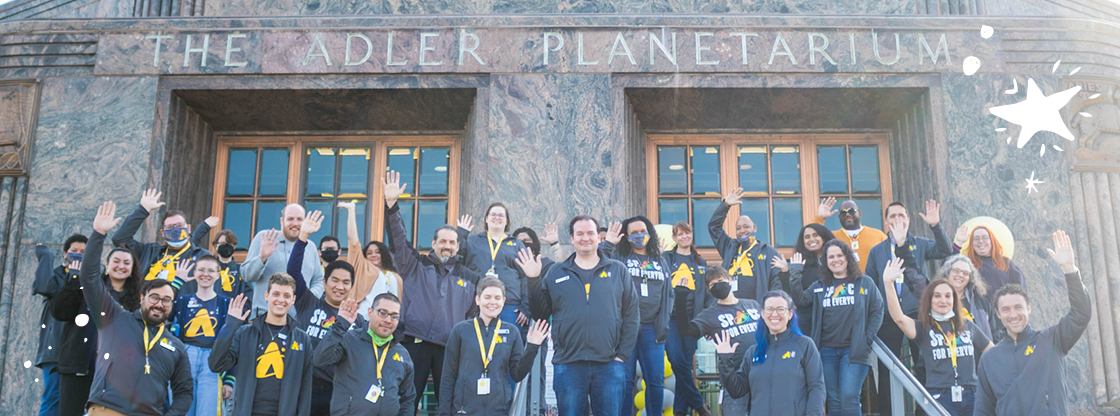
Meet the Adler Planetarium researchers!
Embedded within a cultural institution that deeply values the ‘public scholar’ ethos, Adler’s researchers have an opportunity for authentic and frequent engagement with the public. This experience grows our understanding of what resonates, how to make research and discoveries accessible, and what type of communication makes sense with the broader public. In turn, Adler researchers are thought leaders in their professional communities, serving on advisory boards and planning committees and helping to set a tone and culture of valuing professionals who are engaging the public in their science. Our leadership emerges from our grounding in both theory and practice, with Adler Zooniverse, Far Horizons, Astronomy Conversations, and our Visiting Researchers Program as playing fields in which to experiment with and refine our ideas.
Meet these fine, friendly, folks below.
ADLER ASTRONOMERS
Adler astronomers contribute key efforts in cutting-edge research in astrophysics, with a particular focus on exoplanet discovery and characterization, fundamental research in stellar astrophysics, characterizing supermassive black hole binaries and the gravitational waves they emit, and understanding and mapping light pollution in urban centers.
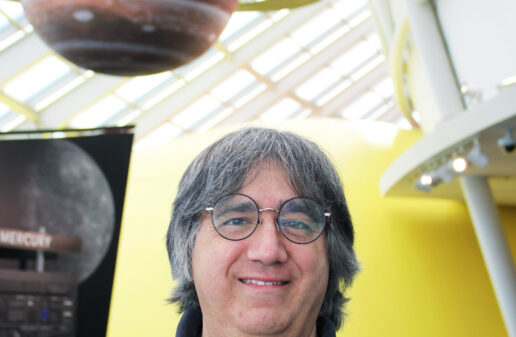
Dr. Geza Gyuk, Senior Director of Astronomy
Since joining the Adler in 2000, Dr. Geza Gyuk’s research has spanned a range of topics, including Cosmology, high energy astrophysics, ultra-cool white dwarves, the characterization of active and outer-belt asteroids and the extent and effects of light pollution. He has focused his educational efforts on bringing authentic science to the public, including through founding the Adler’s Far Horizons program and co-originating the vision of the Zooniverse at the Adler and the University of Oxford. Geza earned his B.S. from Brown University and his Ph.D. in Physics at the University of Chicago.

Dr. Mike Zevin, Astronomer
Dr. Mike Zevin joined the Adler as an astronomer in 2023, following his experience as a NASA Hubble Postdoctoral Fellow at the University of Chicago. His research focuses on understanding how we can decipher the lives and deaths of stars using gravitational waves. He is a member of the LIGO Scientific Collaboration and one of the leads of the Zooniverse GravitySpy.org project. Mike earned his B.S. from the University of Illinois Urbana-Champaign and his Ph.D. from Northwestern University. Prior to pursuing his Ph.D., Mike was an education specialist at the Adler, engaging guests throughout the exhibits and honing his science communication skills.

Dr. Caitlin Witt, Adler - CIERA Postdoctoral Fellow
Dr. Caitlin Witt is the Adler-CIERA Postdoctoral Fellow, jointly appointed between Northwestern University and the Adler. Her main research interests are supermassive black hole binaries (SMBHBs), the low frequency gravitational waves they emit, and their effects on their host galaxies. As a member of the North American Nanohertz Observatory for Gravitational Waves (NANOGrav), Caitlin leads efforts to detect continuous gravitational waves from individual SMBHBs with pulsar timing arrays and develop methods to use information learned in electromagnetic searches for SMBHBs in multi-messenger searches for these elusive pairs. She is also interested in searches for periodicity in AGN light curves, efficient computational analysis of large data sets, and data visualization. At Adler, Caitlin is working with the Public Observing team to develop a research program for Chicago students using Adler’s Doane Observatory. Caitlin earned her B.A. from Cornell University and her Ph.D. in Physics from West Virginia University.

Dr. L. Clifton Johnson, Co-Director of Adler Zooniverse and Zooniverse Science Lead
Dr. L. Clifton Johnson’s research focuses on understanding star formation behavior at spatial scales ranging from that of galaxies down to individual star-forming complexes. Cliff investigates the formation and evolution of star cluster populations and young pre-main sequence star populations in nearby galaxies, including the Andromeda Galaxy and the Magellanic Clouds and how star and cluster formation processes depend on galactic environment. Cliff also works closely with Sam Blickhan and Laura Trouille to lead the strategic vision for Zooniverse and managing the research and development of new tools and resources. Cliff earned his B.A. from Colby College and his Ph.D. in Astronomy from University of Washington.

Dr. Laura Trouille, VP of Science Engagement, Zooniverse PI
Dr. Laura Trouille has been leading the Adler’s Science Engagement efforts since 2015. Before that time she held a joint appointment as an astronomer between Northwestern University and the Adler, with parallel research efforts in astronomy and science education (galaxy evolution and the impact of computational thinking in K-12 STEM education). She continues to be engaged in research through Zooniverse, including efforts in gravitational waves, planet hunting, and learning and attitudinal impacts through citizen science. She earned her B.A. from Dartmouth College and her Ph.D. in Astronomy from the University of Wisconsin-Madison.
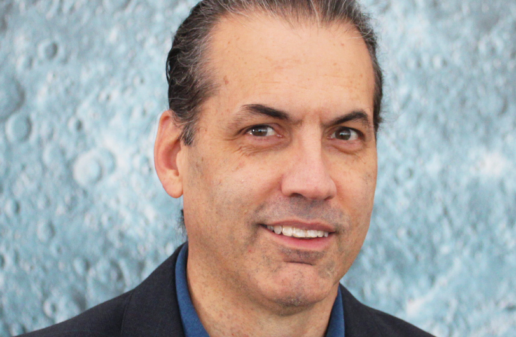
Dr. Andrew Johnston, VP of Museum Experience and Collections
Dr. Andrew Johnston leads the Adler’s efforts in development of museum experiences, exhibitions, theater productions and operations, public observing, history of astronomy research, and conservation of and outreach with the Adler’s world-renowned collections. Andrew has worked in science museums since the late 1980s, conducting research and developing public programs. He earned his Ph.D. in Geographical Sciences from the University of Maryland, College Park.
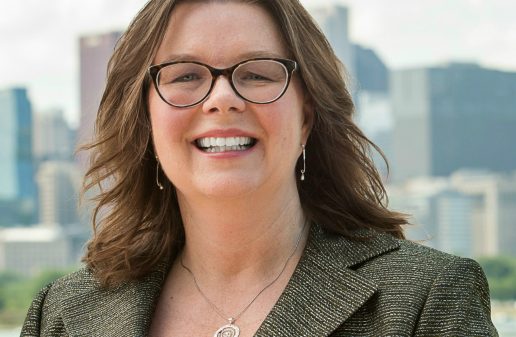
Dr. Michelle Larson, President & CEO
Dr. Michelle Larson has served as Adler’s President & CEO since 2013, leading the institution’s commitment to tangibly connect people to the Universe and each other under the sky we all share. She has held leadership roles as Vice Provost and Professor of Physics at Utah State University, Deputy Director of the Center for Gravitational Wave Physics at Penn State, and Deputy Director of NASA’s Montana Space Grant Consortium. Michelle’s research focus was on neutron star interiors. Michelle earned her PhD in Physics from Montana State University and was a postdoc in high energy astrophysics at Caltech.
ADLER ZOONIVERSE
The Adler Zooniverse is the world’s largest platform for people-powered research, engaging over 2.5 million people worldwide in dozens of active projects across the disciplines, from astronomy to zoology, cancer research to climate science, arts and humanities. Zooniverse projects have led to over 450 peer-reviewed research publications. Zooniverse was co-founded in 2007 by the Adler Planetarium and the University of Oxford.
Learn more about Adler Zooniverse

Dr. Samantha Blickhan, Co-Director of Zooniverse and Digital Humanities Lead
Dr. Samantha Blickhan is the Humanities Lead for Zooniverse and Co-Director of the Zooniverse team at the Adler. She guides the strategic vision for Zooniverse Humanities efforts and manages development of new tools and resources to support GLAM/Humanities crowdsourcing projects, as well as raising philanthropic and federal grant support for the Zooniverse. Sam’s research interests include user experience design, ethical practices in crowdsourcing, quality control methods for text transcription, and sustainable web development. Sam earned her B.A. from the University of Iowa in English Literature and Voice Performance, her Masters from the University of Oxford and her Ph.D. in Musicology from Royal Holloway, University of London.

Dr. L. Clifton Johnson, Co-Director of Zooniverse and Zooniverse Science Lead
See Cliff’s bio in the “Adler Astronomers” section above.

Adler Zooniverse Software Engineering Team
The Adler is home to over half of the Zooniverse web development and research infrastructure team, working closely with our Zooniverse colleagues at the University of Oxford and University of Minnesota. Sean Miller is the Zooniverse designer, leading UI, UX, and design choices for the platform. Zach Wolfenbarger is the Zooniverse devOps and Infrastructure Engineer, focused on the durability and resilience of the platform. Michelle Yuen is our Zooniverse back-end developer and Mark Bouslog and Delilah Clement are our Zooniverse front-end developers, responsible for maintaining and building out new infrastructure in support of Zooniverse research impacts and public engagement.

Dr. Laura Trouille, VP of Science Engagement, Zooniverse Co-PI
See Laura’s bio in the “Adler Astronomers” section above.
HISTORY & COLLECTIONS
The Adler has one of the largest and most significant collections of historic scientific instruments in the world, as well as rare books, manuscripts, archival materials, models, and photographs. Items from the Adler’s collections can be found throughout the museum in our exhibition spaces and our Online Catalog provides public access to our digitized collection of objects, books, historical photographs, and archival materials. In addition, through our partnership with Google Arts and Culture we have created dozens of online exhibitions based on our digitized collections.
Explore our history & collections

Dr. Andrew Johnston, VP of Museum Experience & Collections
See Andrew’s bio in the “Adler Astronomers” section above.

Dr. Katie Boyce-Jacino, Curator & Director of Collections
Dr. Katie Boyce-Jacino is the Curator and Director of Collections at the Adler. She oversees the museum’s collections of artifacts, rare books, archives, and modern library. Her research focuses on the cultural history of astronomy in the twentieth century, with a particular interest in the history of planetariums and other public astronomy institutions. Her dissertation was on the history of planetariums in Germany. She earned her B.A. in History and Astronomy from Wesleyan University and her Ph.D. in Intellectual History from Johns Hopkins University.

Chris Helms, Senior Collections Manager
Chris Helms is the Adler Planetarium’s Senior Collections Manager, tasked with overseeing the care and handling of the Adler’s three-dimensional artifacts collection. Chris has extensive collections management, registrarial, and exhibitions experience, including environmental monitoring and logistics, artifact handling, project management, exhibition design and installation, loan management, object conservation management, and database management. Chris earned his Masters in Public History from Illinois State University.

Delaney Cummings, Collections Specialist
Delaney Cummings is responsible for assisting with access to, the care of, and record keeping of the Adler Planetarium’s important artifact collection. Delaney also works to make the collection more accessible through processes such as the digitization of the collection. Delaney earned her B.A. in American Studies from Coe College and her Master of Arts degree in Museum Studies from George Washington University.
FAR HORIZONS LAB
Far Horizons is a scientific research and engineering program at the Adler Planetarium, engaging students, volunteers and the public in hands-on, participatory research projects. This program engages students, volunteers and the general public in current research through high altitude ballooning (HAB) missions and construction of earth orbiting satellites. Having completed almost 150 HAB missions, Far Horizons is currently conducting NITELite, a series of flights monitoring time variation and angular dependence of light pollution in the Chicago metropolitan region, and participating in the NightWatch collaboration which is designing an orbital mission to map the Earth at night in unprecedented spatial and spectral resolution. A recent highlight is the Far Horizons leadership in the successful designation of the world’s largest Urban Night Sky Place, The Palos Preserves southwest of Chicago.
Check out more about Far Horizons

Dr. Geza Gyuk, Senior Director of Astronomy
See Geza’s bio above in the “Adler Astronomers” section.

Kelly Borden, Director of Youth Engagement
Kelly Borden leads the strategic visioning, planning, development, implementation, and oversight of youth engagement programs at the Adler. Kelly mentors and supervises the Youth Engagement and Far Horizons staff, builds and maintains collaborations with external partners, and raises philanthropic and federal grant support for the Adler’s Youth Engagement efforts. Prior to joining the Adler in 2009, Kelly was a substitute teacher for the Chicago Public Schools, a School Programs facilitator at the Museum of Science and Industry, and a Museum Education Assistant at the Lake County Forest Preserve District. Kelly earned a B.A. in anthropology from Binghamton University and a Masters in Archaeology from University College London.

Ken Walczak, Senior Manager of Far Horizons
As Senior Manager of Far Horizons, Ken Walczak mentors students, connects Far Horizons with industry and other research partners, and manages the engineering and design efforts for the high-altitude balloons and ground observing network. Ken uses his experience in design, management, and a life-long passion for science to enable the research and engineering carried out by the Far Horizons team. He is a co-author of numerous papers on the design and use of innovative instrumentation for light pollution research and has given numerous presentations on the topic. Ken is a board member of the International Dark-Sky Association and an associate member of the Illuminating Engineering Society (IES). He studied photography, owned a furniture and lighting design company and managed numerous businesses before his time at the Adler.

Cynthia Tarr, Far Horizons Program Specialist
As the Far Horizons Program Specialist, Cynthia Tarr keeps the lab running, trains new participants, and maintains a database that tracks more than fifteen years of Far Horizons flights and experiments. Cynthia helps orient new participants, drafts the guides and references used on every flight, and helps support the program’s research efforts.

Lauren Wisbrock, Teen Programs Manager, Far Horizons
Lauren Wisbrock leads the design and implementation of programs engaging teens in Far Horizons hands-on research and engineering efforts. Prior to joining the Adler in 2020, Lauren was a high school biology teacher and musical director. Lauren earned her B.S. in Biology and Bachelors in Secondary Education and Teaching from Loyola University, as well as her Masters in Biology from Loyola.

Waleska Do Valle Santos, Teen Programs Manager, YOLO
Waleska Do Valle Santos leads the Far Horizons advocacy and community engagement efforts, including designing and implementing the flagship Youth Organization for Lights Out (YOLO) environmental advocacy program based at Little Village Lawndale High School focusing on the effects of urban light pollution. Participants learn about light pollution—its impact on human health and its effects on our environment—and engage with their local communities through science and advocacy. . Prior to joining the Adler in 2021, Waleska earned her bachelor degree in science teaching from the University of São Paulo and was a graduate student in Southern Illinois University’s STEM Center working on the Environmental Health Investigators program.

Dr. Zach Hafen-Saavedra, Far Horizons Postdoctoral Fellow
Dr. Hafen-Saavedra is the data scientist responsible for turning the images collected by students, volunteers, the public, and Adler’s Far Horizons team into scientific data products. These products are used by the Adler and its partners to study the effects of light pollution on human health, animal behavior, plant growth, and more. Zach received his PhD in Astrophysics at Northwestern University, where he built and analyzed supercomputer simulations of the universe, with a focus on our pre-earth history. He subsequently spent three years as a prize postdoctoral fellow at UC Irvine before joining the Adler team.
DOANE OBSERVATORY RESEARCH
In 2020, a new 24-inch (0.6 m) PlaneWave CDK24 reflector telescope was installed. The new infrastructure and installations support both public observing activities and conducting original research.
While the Doane Observatory is located within light polluted skies, we can routinely produce reliable photometry on V=18 stars. Available research equipment includes a ZWO ASI183MM monochrome camera and ZWO electronic filter wheel with Sloan VBIR filters, a diffraction grating filter, and a methane filter. Current research interests involve photometry to create variable star and asteroid rotational light curves. Future research opportunities include supernovae monitoring, blazar monitoring, exoplanet observations, detecting impacts on Jupiter, and more.
Learn more about our Doane Observatory
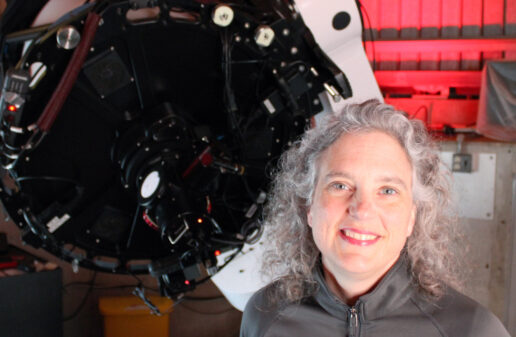
Michelle Nichols, Director of Public Observing
Michelle Nichols is Director of the Doane Observatory and leads all of Adler’s telescope observing and sky observing programs, initiatives, and events, including Sky Observers Hangout, ‘Scopes in the City, public facilitation of the Doane Observatory, and Astro Road Trip, Adler’s annual public observing/public outreach traveling science roadshow. Nichols joined the Adler in 1995. Michelle earned her B.S. in Physics and Astronomy from the University of Illinois at Urbana-Champaign and her Master of Education degree in Curriculum and Instruction from National-Louis University.

Dr. Geza Gyuk, Director of Astronomy
See Geza’s bio in the “Adler Astronomers” section above.

Dr. Caitlin Witt, Adler - CIERA Postdoctoral Fellow
See Caitlin’s bio in the “Adler Astronomers” section above.

Hunter Miller - Public Observing Educator
Hunter Miller joined the Adler’s Public Observing team in 2022. Before joining the Adler he worked in a range of formal and informal education roles, including at the Art Institute of Chicago, WonderLab Museum of Science, Wylie House Museum, and as a student teacher in the Indianapolis Public Schools. Hunter earned his B.A. in Anthropology from Indiana University Bloomington.

Dylan Borgerding - Public Observing Educator
Dylan joined the Adler Planetarium’s Public Observing team in 2024 after working as a Theater Presenter and Developer for Adler’s Theaters team. He began his planetarium career in 2017 at the Longway Planetarium in Flint, Michigan, where he gained experience in astronomy education. He later worked at the University of Michigan’s Museum of Natural History in Ann Arbor. Dylan holds a B.A. in Communications and Media from the University of Michigan-Ann Arbor, which supports his work in science communication and public outreach.
DATA VISUALIZATION & EVALUATION
Adler’s in-house data visualization engineers bring depth and visual richness to our planetarium shows, exhibit experiences, and online engagement. In addition to creating visualizations incorporated throughout our exhibit spaces, this team powers our Space Visualization Lab (SVL). Since its inauguration in 2007, the SVL welcomes guests to engage with interactive and immersive visualizations while chatting with astronomers and engineers from universities and research institutes from across the Chicagoland area.
The Adler’s in-house evaluation expertise provides business intelligence, data wrangling, and data analysis vital to addressing Adler’s reporting needs and being able to robustly share our story of impact.

Patrick McPike, Visualization Engineer
As a member of Adler’s Space Visualization Group, Patrick McPike specialize in immersive spaces, dome theaters and space visualization, and is an artist, storyteller, Visualization Engineer, and helps lead Dome Show production at the Adler. Patrick has collaborated with Sesame Workshop, NASA, NCSA, and numerous other planetarium and outside partners, writers and directors to create some of the most popular dome shows to date, including the first ever 8K (67 megapixel) dome show produced in the US. Patrick’s work is currently shown in numerous planetariums around the world and my visualizations have been featured on the cover of Science magazine and in many exhibits and festivals.
